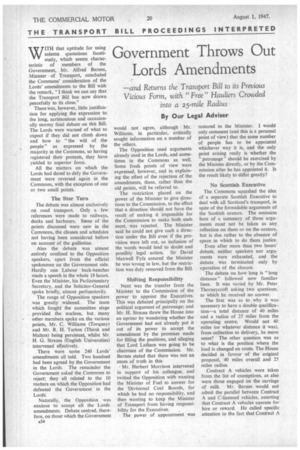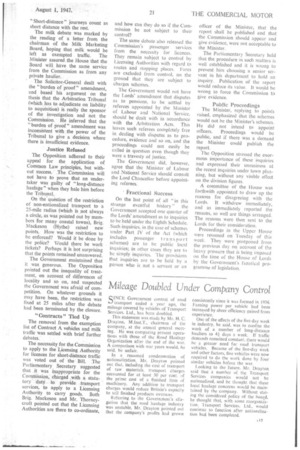Government Throws Out Lords Amendments
Page 44

Page 47

If you've noticed an error in this article please click here to report it so we can fix it.
—and Returns the Transport Bill to its Previous Vicious Form, with "Free" Hauliers Crowded into a 25-mile Radius
By Our Legal Adviser
WITH that aptitude for using solemn quotations facetiously, which seems characteristic of members of the Government, Mr. Alfred Barnes, Minister of Transport, concluded the Commons' consideration of the Lords' amendments to the Bill with the remark, "I think we can say that the Transport Bill has now drawn peacefully to its close."
There was, however, little justification for applying the expression to the long, acrimonious and occasionally stormy final debate on this Bill. The Lords were warned of what to expect if they did not climb down and bow to "the will of the people" as expressed by the majority in the Commons, so having registered their protests, they have yielded to superior force.
All the matters on which the Lords had dared to defy the Government were reversed again in the Commons, with the exception of one or two small points.
The Star Turn
The debate was almost exclusively on road transport. Only a few references were made to railways, docks and harbours. Some of the points discussed were new in the Commons, the clauses and schedules not having been considered before on account of the guillotine.
Also the debate was almost ,entirely confined to the Opposition speakers, apart from the official spokesmen on the Government side. Hardly one Labour back-bencher made a speech in the whole 18 hours.
• Even the Minister, his Parliamentary Secretary, and the Solicitor-General spoke briefly, almost perfunctorily. The range of Opposition speakers was greatly widened. The team which fought the committee stage provided the nucleus, but many other members spoke on the various points, Mr. C. Williams (Torquay) and Mr. R. H. Turton (Thirsk and
• Malton) being persistent, whilst Mr. H. G. Strauss (English Universities) intervened effectively.
There were some 240 Lords' amendments all told. Two hundred had been agreed by the Government in the Lords. The remainder the Government asked the Commons to reject; they all related to the 10 matters on which the Opposition had defeated the Government in the Lords.
Naturally, the Opposition was anxious to accept all the Lords • amendments. Debate centred, therefore, on those which the Government a34 would not agree, although Mr. Williams, in particular, critically sought information on a number of the others.
The Opposition used arguments already used in the Lords, and sometimes in the Commons as well. Some fresh points of view were expressed, however, and in explaining the effect of the rejection of the amendments, these, rather than the old points, will be referred to.
The restriction placed on the power of the Minister to give directions to the Commission, to the effect that a direction 'should not have the result of making it impossible for the Commission to make both ends meet, was rejected. The Minister said he could not give such a direction under the Bill even if the provision were left out, so inclusion of the words would lead to doubt and possibly legal action. Sir David Maxwell Fyfe assured the Minister he was wrong in law, but the restriction was duly removed from the Bill.
Shifting Responsibility Next was the transfer from the Minister to the Commission of the power to appoint the Executives. This was debated principally on the political argument of patronage; and Mr. H. Strauss threw the House into an uproar by wondering whether the Government had not already put it out of its power to accept the amendment by the promises made for filling the positions, and alleging that Lord Latham was going to be chairman of the Commission. Mr. Barnes stated that there was not an atom of truth in this.
• Mr. Herbert Morrison intervened in support of his colleague, and twitted the Opposition with wanting the Minister of Fuel to answer for the Divisional Coal Boards, for which he had no responsibility, and then wanting to keep the Minister of Transport from having responsi bility for the Executives. , The power of appointment was
restored to the Minister. I would only comment (and this is a personal point of view) that the same number of people has to be appointed whichever way it is, and the only point arising really is whether the "patronage" should be exercised by the Minister directly, or by the Commission after he has appointed it. Is the result likely to differ greatly?
No Scottish Executive The Commons squashed the idea of a separate Scottish Executive to deal with all Scotland's transport, in spite of the formidable arguments of the Scottish orators. The omission here of a summary of those arguments must not be taken as any. reflection on them or on the orators, but is due rather to the absence of space in which to do them justice.
Even after more than two hours' debate, neither speakers nor arguments were exhausted, and the debate was terminated only by operation of the closure.
The debate on how long is "long distance" followed now familiar. lines. It was varied by Mr. Peter Thorneycroft asking two questions, to which he received no answer.
The first was as to why it was necessary to have a double qualification—a total distance of 40 miles and a radius of 25 miles from the operating centre. Would not 40 miles (or whatever distance it was}, from collection to delivery, be more sense? ' The other question was as to what is the position where the load is changed en route. The House decided in favour of the original proposal, 40 miles overall and 25 miles radius.
Contract A vehicles were taken from the list of exemptions, as also were those engaged on the carriage of milk. Mr. Barnes would not admit the parallel between Contract A and C-licensed vehicles, asserting that Contract A vehicles operate for hire or reward. He called specific attention in the fact that Contract A, "Short-distance" journeys count as short distance with the rest.
The milk debate was marked by the reading of a letter from the chairman of the Milk Marketing Board, hoping that milk would be left as exempted traffic. The Minister assured the House that the Board will have the same service from the Commission as from any private haulier.
The Solicitor-General dealt with the "burden of proof" amendment, and based his argument on the thesis that the Arbitration Tribunal (which has to adjudicate on liability to acquisition) is really the sponsor of the investigation and not the Commission. He inferred that the "burden of proof" amendment was inconsistent with the power of the Tribunal to give a decision where there is insufficient evidence.
Justice Refused The Opposition adhered to their appeal for the application of Common Law principles, but without success. The Commission will not havc to prove that an undertaker was guilty of "long-distance haulage" when they hale him before the Tribunal.
On the question of the restriction of non-nationalized transport to a 25-mile radius (which is not always a circle, as was pointed out by members for many coastal towns), Brig. Mackeson (Hythe) raised new points. How was the restriction to be enforced? Would it be done by the police? Would there be work tickets? Perhaps it is 'hot surprising that the points remained unanswered, The Government maintained that it was generous. The Opposition pointed out the inequality of treatment, on account of differences of locality and so on, and suspected the Government was afraid of competition. On whatever grounds it may have been, the restriction was fixed at 25 miles after the debate had been terminated by the closure.
"Contracts" Tied Up
The removal from the exemption list of Contract A vehicles and milk traffic was settled with brief further debates.
The necesssity for the Commission to apply to the Licensing Authority for licences for short-distance traffic was voted out of the Bill. The Parliamentary Secretary suggested that it was inappropriate for the Commission, charged with a statutory duty to provide transport services, to apply to a Licensing Authority to carry goods. Both Brig. Mackeson and Mr. Thorneycroft pointed out that the Licensing Authorities are there to co-ordinate,
and how can they do so if the Commission be not subject to their control?
The same debate also released the Commission's passenger: services from the necessity for licences. They remain subject to control by Licensing Authorities with regard to routes and stopping places. Fares are excluded from control, on the ground that they are subject to charges schemes.
The Government would not have the Lords' amendment that disputes as to pensions, to be settled by referees appointed by the Minister of Labour and National Service, should be dealt with in accordance with the Arbitration Acts. This leaves such referees completely free in dealing with disputes as to procedure, evidence and so on, and the proceedings could not easily be called in question even though they were a travesty of justice. •
The Government did, however, agree that the Minister of Labour and National Service should consult the Lord Chancellor before appointing referees.
' Practional Success
On the last point of all "in this strange eventful history" the Government accepted one quarter of the Lords' amendment as to inquiries to be held under the Eighth Schedule. Such inquiries, in the case of schemes under Part IV of the Act (which includes passenger transport schemes) are to be public local inquiries; in other cases they are to be simply inquiries. The provisions that inquiries are to be held by a person who is not a servant or an
officer of the Minister, that the report shall be published and that the Commission should appear and give evidence, were not acceptable to the Minister.
The Parliamentary Secretary held that the procedure in such matters is well established and it is wrong to prevent him choosing a senior servant in his department to hold an inquiry. Publication of the report would reduce its value. It would be wrong to force the Commission to give evidence.
Public Proceedings
The Minister, replying to points raised, emphasized that the schemes would not be the Minister's schemes. He did not intend to appoint officers. Proceedings would be public, and if there was a demand the Minister could publish the report.
The Opposition stressed the enormous importance of these inquiries and expressed their uneasiness at the recent inquiries under town planning, but without any visible effect on the division figures.
A committee of the House was forthwith appointed to draw up the reasons for disagreeing with the Lords. It withdrew immediately, and as immediately reported the reasons, so well are things arranged. The reasons were then sent to the Lords for their consideration.
Proceedings in the Upper House were resumed on Tuesday of this week. They were postponed from the previous day on account of the heavy pressure that is being imposed on the time of the House of Lords by the Government's fanatical programme of legislation.












































































